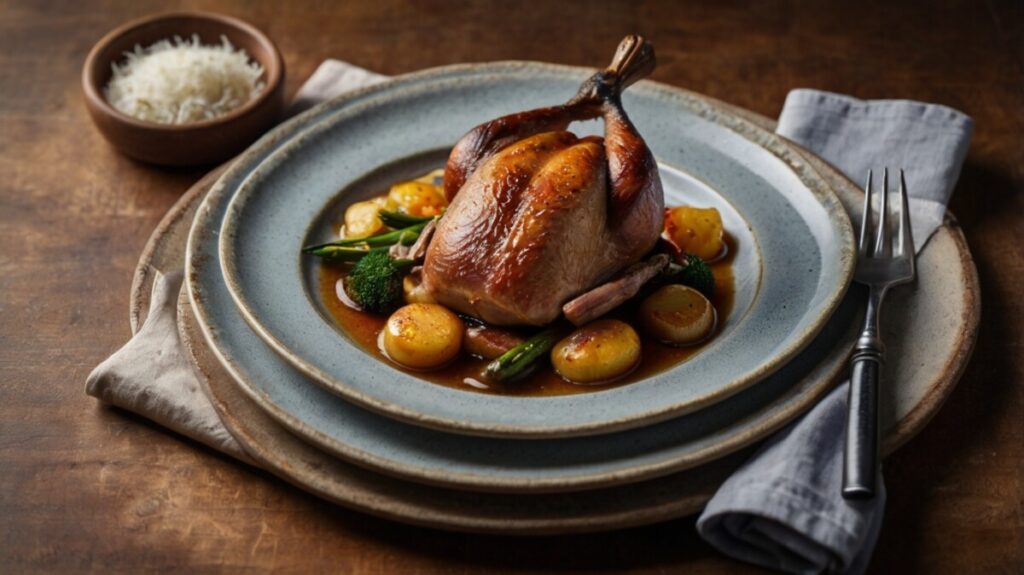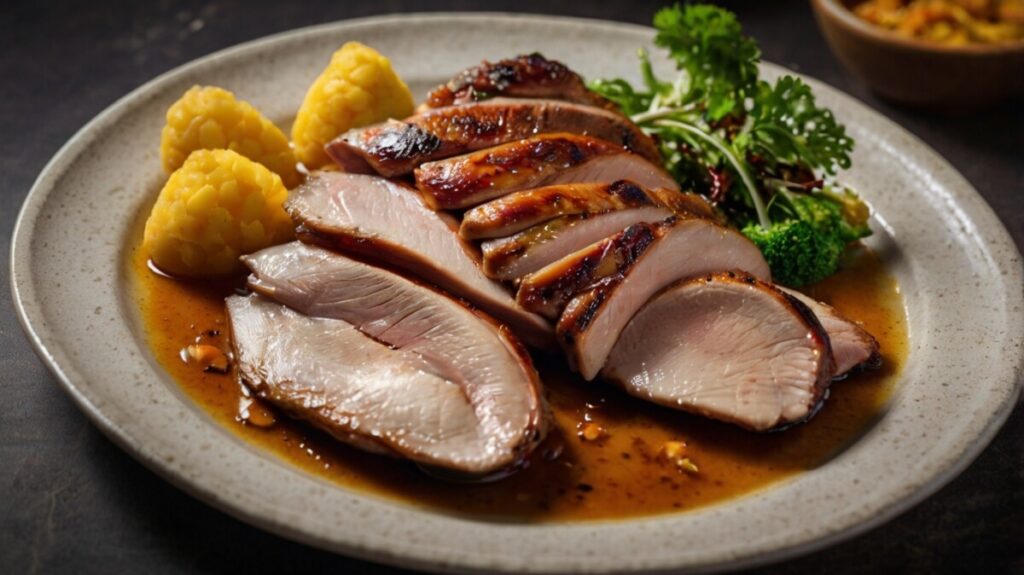“The Nutritional Benefits of Eating Duck”

When it comes to exploring new sources of nutrition, duck often gets overlooked. However, this comprehensive guide aims to unlock the nutritional power of duck and shed light on why it should be considered an excellent addition to your diet. From its unique flavor and texture to its impressive nutritional profile, we will delve into the many nutritional benefits of eating duck. Additionally, we will debunk common myths about duck nutrition to provide you with accurate information when making dietary choices.
Differentiating Duck: Understanding its Nutritional Power
Duck meat is a rich source of essential nutrients that can contribute to a healthy lifestyle. It is high in protein, which is crucial for muscle repair and growth. Duck is also an excellent source of iron, which supports healthy blood circulation and energy production. Additionally, it contains important vitamins and minerals such as zinc, selenium, and B vitamins, which are essential for various bodily functions. Incorporating duck into your meals can provide a well-rounded nutritional boost.
Common Myths about Duck Nutrition
There are some misconceptions surrounding the nutritional value of duck, which often discourage people from including it in their diet. One prevalent myth is that duck is always high in fat. While it is true that duck does contain more fat compared to other poultry, not all of it is unhealthy. In fact, much of the fat found in duck is monounsaturated, which is beneficial for heart health. Another myth is that duck is excessively salty, but this depends on the preparation and seasonings used. [4]
Key Nutrients in Duck
This comprehensive guide aims to unlock the many benefits of including duck in your diet. From its unique flavor and texture to its impressive nutritional profile, we will delve into the key nutrients that make duck an excellent addition to your meals.
Protein: The Building Block of Good Health
Duck meat is a rich source of protein, which is essential for muscle repair and growth. Protein plays a vital role in our overall health, helping to build and repair tissues, produce enzymes and hormones, and support a healthy immune system. Incorporating duck into your diet can provide a high-quality source of protein that can contribute to a well-rounded and balanced nutritional intake.
Vitamins and Minerals in Duck: A Nutritional Goldmine
Duck is also packed with important vitamins and minerals. It is a good source of iron, which is crucial for healthy blood circulation and energy production. Duck also contains important nutrients such as zinc, selenium, and various B vitamins, which are essential for maintaining optimal health and bodily functions. By incorporating duck into your meals, you can enjoy a wide range of important vitamins and minerals that can contribute to your overall well-being.
With its nutritional power and unique taste, duck is a versatile and healthy choice that can add diversity to your diet. By understanding the key nutrients it offers, you can make informed dietary choices and unlock the full potential of this delicious protein source. [7]
Health Benefits of Incorporating Duck in Your Diet
When it comes to nutrition, duck is a protein-packed powerhouse that offers a range of health benefits. In this comprehensive guide, we will delve into the unique nutritional profile of duck and explore how it can enhance your overall well-being.
Heart-Healthy Fats: Promoting Cardiovascular Well-being
Contrary to popular belief, not all fats are bad for you. Duck meat contains a healthy balance of monounsaturated and polyunsaturated fats, including omega-3 fatty acids. These heart-healthy fats have been shown to promote cardiovascular health by reducing bad cholesterol levels and lowering the risk of heart disease. By incorporating duck into your diet, you can enjoy the delicious taste while nourishing your heart.
Boosting Immunity: Duck’s Role in Strengthening the Immune System
Duck is packed with essential vitamins and minerals that play a crucial role in supporting a strong immune system. It is rich in selenium, which is known to enhance immune function and help protect against infections. Duck also provides important vitamins like vitamin B6 and niacin, which are essential for maintaining a healthy immune response. By including duck in your meals, you can give your immune system a natural boost.
Cooking with Duck: Tips and Techniques

When it comes to cooking with duck, there are a few key tips and techniques that can help you unlock its full flavor potential. Whether you’re a seasoned chef or a home cook looking to experiment with new ingredients, these suggestions will ensure that your duck dishes turn out tender and flavorful.
Tender and Flavorful: Cooking Duck to Perfection
Choose the Right Cut: Duck can be cooked whole, or you can opt for specific cuts like breasts or legs. Each cut requires a different cooking method and timing, so be sure to choose the right cut for your recipe.
Render the Fat: Duck is known for its rich fat content, which adds flavor and moisture to the meat. Before cooking, score the skin and render the fat by gently cooking the duck in a pan over low heat. This process not only enhances the flavor but also results in crispy skin.
Marinate for Flavor: Marinating the duck before cooking can infuse it with even more flavor. Consider using citrus juices, soy sauce, herbs, and spices to create a delicious marinade. Allow the duck to marinate for at least an hour, or overnight for maximum flavor.
Cook Low and Slow: Duck is best cooked low and slow to ensure tender and juicy meat. Roasting or braising are popular cooking methods for duck, allowing the meat to slowly cook and develop rich flavors.
Innovative Duck Recipes to Try at Home
Duck Confit: This classic French dish involves curing and slow-cooking duck legs in their own fat. The result is incredibly tender and flavorful meat that falls off the bone. Serve with roasted potatoes and a green salad for a delicious meal.
Asian-inspired Duck Stir-Fry: Slice duck breasts into thin strips and stir-fry with vegetables like bok choy, mushrooms, and bell peppers. Add a flavorful sauce made with soy sauce, ginger, garlic, and hoisin sauce for an Asian-inspired twist.
Duck Tacos: Shred cooked duck meat and serve in warm tortillas with your favorite taco toppings like salsa, avocado, and lime. The rich and flavorful duck meat adds a gourmet touch to this beloved Mexican dish.
By following these cooking tips and trying out innovative duck recipes, you can elevate your culinary skills and enjoy the unique flavors of this protein-packed powerhouse. So, get creative in the kitchen and discover the delicious possibilities of cooking with duck.
Sustainability and Ethical Considerations
When it comes to cooking with duck, there are not only flavor considerations but also sustainability and ethical aspects to keep in mind. Understanding where your duck comes from and how it is produced can help you make responsible choices and support sustainable practices in the food industry.
Responsible Sourcing: Ensuring Sustainable Duck Production
Responsible sourcing involves selecting duck products that come from farms or suppliers that prioritize sustainable practices. Look for certifications like organic or free-range, which indicate that the ducks were raised in environmentally friendly conditions. These practices ensure that the ducks have access to outdoor spaces and are able to engage in natural behaviors, resulting in healthier and more flavorful meat. By supporting responsible sourcing, you contribute to the preservation of biodiversity and promote sustainable farming methods.
The Importance of Ethical Choices in the Food Industry
Ethical considerations go beyond environmental sustainability. It is crucial to support businesses that prioritize animal welfare and fair labor practices. Look for brands that emphasize the humane treatment of ducks and have transparent supply chains. Avoid products that are associated with practices such as force-feeding or overcrowding. By making ethical choices, you contribute to creating a more humane food industry and ensure that the ducks used in your recipes are treated with care and respect.
By considering factors like responsible sourcing and ethical choices, you can unlock the nutritional power of duck while supporting sustainable and ethical practices in the food industry. So, next time you cook with duck, remember to make informed choices that align with your values and contribute to a better food system. [17]
Conclusion
In conclusion, incorporating duck into your diet offers numerous health benefits. From promoting cardiovascular well-being to strengthening the immune system, duck is a nutritious and delicious addition to your meals. By understanding the nutritional power of duck, you can make informed choices and unlock its full potential for a healthier lifestyle.
https://holisticwellnesswave.com/index.php/2024/04/10/health-benefits-of-turmeric-powder/
https://www.ncbi.nlm.nih.gov/
FAQs
What are the nutritional benefits of eating duck?
Answer: Duck is a nutrient-dense meat rich in high-quality protein essential for muscle repair and growth. It contains significant amounts of essential vitamins such as B vitamins (including B12 and niacin), which play key roles in energy metabolism and nervous system function. Duck is also a good source of minerals like iron, important for red blood cell formation, and phosphorus, crucial for bone health. It provides beneficial fats, including monounsaturated and polyunsaturated fats, which support heart health when consumed in moderation. Additionally, duck meat offers selenium, an antioxidant that helps protect cells from damage and supports immune function.
How does duck compare nutritionally to other poultry?
Answer: Nutritionally, duck offers a unique profile compared to other poultry like chicken or turkey. It tends to have higher levels of fat, including beneficial monounsaturated and polyunsaturated fats. Duck is also richer in certain vitamins and minerals such as B vitamins (especially B12), iron, and selenium compared to chicken or turkey. However, it’s important to note that duck is higher in calories and fat content, so portion control and choosing lean cuts can help balance its nutritional benefits with dietary goals.
What are healthy ways to prepare duck to retain its nutritional value?
Answer: To retain the nutritional benefits of duck, consider healthy cooking methods such as roasting, grilling, or baking. These methods help minimize additional fat and preserve the meat’s natural nutrients. Avoid frying or cooking with excessive sauces or oils, as these can add unnecessary calories and fats. Prioritize lean cuts of duck, such as duck breast, and trim visible fat before cooking. Pairing duck with vegetables, whole grains, and salads can enhance its nutritional profile and create a balanced meal. By preparing duck thoughtfully, you can enjoy its rich flavor and nutritional benefits while supporting a healthy diet.





